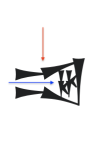The etymology of the name Nineveh is very interesting. Akkadian is a Semitic language and both Aramaic and Hebrew are cognate languages. Akkadian is written in cuneiform a logo-syllabic writing system.
This is the name of Nineveh in Akkadian.
View attachment 11021
This symbol is composed of two parts, one symbol inside another (the outer symbol
red arrow and the inner symbol
blue arrow).
The outer symbol is
eš and it means "shrine, temple, house."
The inner symbol is
kud meaning "fish."
Check page 691 bottom right column and page 691 bottom left column. The two nouns are related.
Vol. 1. A - Muqque.- Vol. 2. Miqqu - Titurru
archive.org
So let's think about this. Jonah was sent the great city of Nineveh (its cuneiform symbol being a fish inside an enclosure) only to be shallow by a great fish. It seems that Jonah was going to end up in a great fish one way or the other.
Matthew 12:38-41........
“Teacher, we wish to see a sign from you.” But he answered them, “An evil and adulterous generation seeks for a sign, but no sign will be given to it except the sign of the prophet Jonah. For just as Jonah was three days and three nights in the belly of the great fish, so will the Son of Man be three days and three nights in the heart of the earth. The men of Nineveh will rise up at the judgment with this generation and condemn it, for they repented at the preaching of Jonah, and behold, something greater than Jonah is here."
I am one who has taught that Jonah actually died when the fish ate him and God then resurrected him from the dad.
I will give you three arguments to support the miraculous death and resurrection of Jonah.
#1.
The phrases "belly of Sheol" and "the Pit" are Old Testament terms that refer to the realm of the dead.
That is seen in Job 7:9, 33:18, Psalm 40:2, 49:14-15, 89:48.
#2.
The original Hebrew says that his soul or nephesh fainted which means literally =
he took his last breath like a dying man.
#3,
When God says to, Jonah
“arise” this is the Hebrew word קוּם.
This is the same word Jesus used when he raised Jairus’ daughter from the dead.
Mark 5:41 reads Taking the child by the hand, He said to her, “Talitha kum!” which translated means, “Little girl, I say to you, get up!”
So now the Jonah parallel makes a lot more sense! But wait, there’s a whole lot more going on here!
In the Jewish reader’s mind, hearing about someone being raised from the dead would be interesting but not mind-blowingly significant. After all, the widow of Zarephath’s son, Shunammite woman’s son, and an Israelite man who came in contact with Elisha’s bones were all raised from the dead. There’s no major religious significance tied with these events, other than they show Elijah and Elisha were powerful prophets.
But that there was an even greater miracle that happened with Jonah —
Nineveh actually repented!
Now, if you know anything about Old Testament history, Nineveh was no friend of Israel. The historical Nineveh was the capital of the Assyrian empire in the late seventh century BC. There was no love lost between the ancient Israelites and Nineveh. The city’s king, Sennacherib, laid siege to Jerusalem in 701 BC (2 Kings 18:13-19:37). Nahum, the prophet, practically rejoices over Nineveh’s destruction by the Babylonians in 612. He says Nineveh is a “city of bloodshed.” (Nah 3:1)
So when Jesus says to the Pharisees that they only sign they would see is the sign of Jonah, he’s not only saying that he’d rise from the dead, but also that the resurrection would turn the pagan Gentiles to the God of Israel. But instead of just one pagan nation turning, much of the Gentile world would turn to God.



